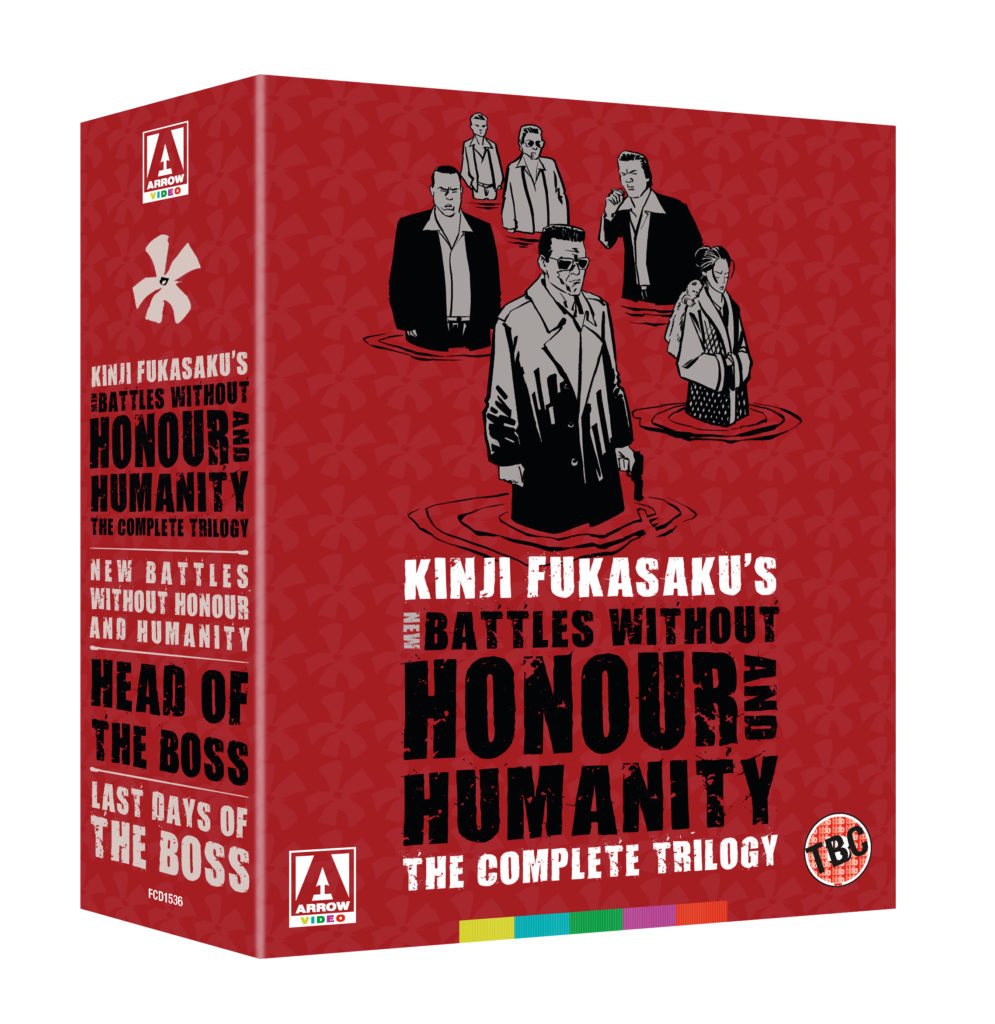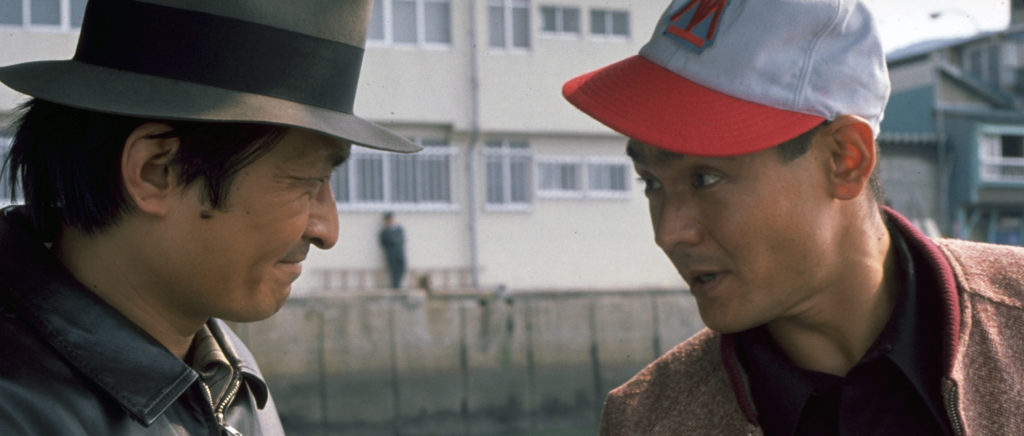Writers: Fumio Konami, Misao Arai (New Battles Without Honor and Humanity), Susumu Saji, Yozo Tanaka, Kôji Takada, (New Battles Without Honor and Humanity: The Boss’s Head), Kôji Takada (New Battles Without Honor and Humanity: Last Days of the Boss)
Cast: Bunta Sugawara, Meiko Kaji, Tsutomo Yamazaki, Nobuo Kaneko, Tomisaburô Wakayama, Kô Nishimura, Mikio Narita, Yuriko Hishimi, Chieko Matsubara
Cert: 15
Running time: 98/94/91mins
Year: 1974/1975/1976
New Battles without Honour and Humanity: ![]()
The Boss’s Head: 
Last Days of the Boss: 
What’s the story: Three unrelated crime stories follow the criminal travails of street-level yakuza and their attempts to make their marks in cruel, dishonourable worlds.
What’s the verdict: Proof that you can’t keep a good franchise down, New Battles without Honor and Humanity was a trilogy of movies from director Kinji Fukasaku following his blockbusting Battles without Honor and Humanity saga.
Across five films, The Battles Without Honor and Humanity series thrilled audiences from 1973 to 1974, depicting the rise of a criminal underdog played by legendary Japanese screen tough guy Bunta Sugawara.
After the final movie, Fukasaku wanted to explore crime avenues new (and would do with such B-movies classics as Graveyard of Honor and Yakuza Graveyard). But, studio Toei tempted him back for another series of movies under the Battles banner.
Featuring standalone tales, The New Battles Without Honor and Humanity trilogy is linked by the return of Sugawara as three different vagabonds. Again, the films are based around Hiroshima, characters’ psyches are as scarred as that tragic city.
Whereas the original saga spanned 10 years and was a savage critique of Japan’s love/hate affair with organised crime, the follow-up films alighted themselves of social commentary.
Breakneck action thrillers, they are cool, callous and gloriously undisciplined. Fukasaku’s directorial trademarks are present and correct: authoritative voice-over propelling the plot forward; staccato editing, including scenes audaciously presented in rapid freeze frames; hand-held camerawork during messy mob hits; percussive psycho jazz score.
Film one essentially returns to the original series’ watering hole, aping themes and plot points. Sugawara is Makio, forced to do prison time after botching a hit on a rival boss.
Upon release, Makio becomes a reluctant Yojimbo character, urged by his sniveling boss Mr. Yamamori (Kaneko) to kill upstart lieutenant Aoki (Lone Wolf and Cub’s Wakayama). Aoki, eying Yamamori’s seat of power, attempts to woo Makio into whacking him.
Packed with more crosses than a bible school, characters here live down to the movies’ titles. Thrill seekers and lowlifes, bereft of honour and humanity.
In an interview with Fukasaku biographer Sadao Yamane included within this box set, the writer claims this second series of Battles… movies placed more importance on female characters than the first.
Modern eyes may roll at this; women are hostess bar commodities to be manhandled and traded, hysterical annoyances or conniving shrews. Films two and three in the series do include interesting female characters, but New Battles… was never intended to strike a blow for woman’s lib.
Film two, The Boss’s Head, is the strongest of the trilogy. Lifting the basic premise of the first New Battles… movie, Sugawara is Shuji, a low-level gangster again forced to do time after a bungled hit.
It seems the real money-making scheme in the yakuza world is teaching effective preparation skills…
Upon release, Shuji expects financial recompense from Tetsuya (Tampopo’s Yamazaki), husband to the beautiful daughter of the crime boss Mr. Owada (Nishimura). But, Tetsuya has become a degenerate heroin addict, unable to repay his friend.
To keep him and his small gang solvent, Shuji re-enters the criminal life, effectively becoming a pawn for more cultured yakuza within the syndicate.
The Boss’s Head expands a theme of working class exploitation suggested in the previous movie. Shuji repeatedly glimpses the good life, but lacks the connections and education to reach it.
Pretender to Owada’s throne, the slippery Aihara (Narita) presents Shuji with a brick of uncut heroin by way of repayment. But, the street-level criminal and his gang of ex-farmers have no access to the infrastructure that could turn brown sugar into green money. Potential wealth becomes an albatross that risks dragging them back to jail.
Also notable is a rare passive role from Japanese B-movie legend, Meiko Kaji. Most famous for the Lady Snowblood and Female Prisoner series, here she is Tetsuya’s put-upon wife, forced to manage their modest bar while he shoots up the profits.
Most electrifying in fearsome roles, this is a great opportunity to see Kaji demonstrate her range as a woman attempting to keep her family together.
The formidable female role here belongs to Hishimi as the black widow, Aya. A jinx for whichever gangster she takes a shine toward, Hishimi brings a welcome vein of black humour to her deadly moll, soothing the brows of harried gangsters who then run into 9mm bad luck.
An impressive third act action car chase was unusual for yakuza films of the time. Fukasaku seems to have identified this as a differentiator from the original saga (he was reportedly dissatisfied with the first New Battles film) and the sequence is a kinetic joy ride of reckless motoring and close quarter gunplay.
A late truck vs. cars battle is a highpoint of Last Days of the Boss, the final film in the series. Sugawara here is Nozaki, a construction worker sucked into the criminal underworld when his adoptive father and local crime boss is killed over a dispute between gangs based in Osaka and Kyushu (the southernmost tip of Japan).
Vowing revenge, he becomes a member of the Kyushu syndicate, but declares open war when discovering Kyushu’s grandiosely named Fellowship of the Seven prefer politics and deal making to honour.
Complicating this is the fact Nozaki’s sister, Asami (Matsubara, in an extension of the Kaji role in The Boss’s Head) is married to a foot soldier in the Osaka gang.
Powered by Nozaki’s uncapped rage and grief, Last Days of the Boss is most fevered of the trilogy. Impressionistic and near avant-garde, the fractured plot flashes backwards and forwards, the voiceover barely keeping check of the runaway story threads.
Even Nozaki’s relationship with Asami is clouded by suspicions of incest, the yakuza world corrupting all bonds.
All three films boast memorable characters, but notable here is Takuya Fujioka as a congested, Vicks snorting crime boss, full of bon homie and rage. Elsewhere is a transvestite assassin, a jailbait moll (presumably the feminine touch Yamane mentioned?), and knife-wielding upstarts looking to make their bones.
Like Robert De Niro’s character in Heat, Nozaki cannot take the easy road to freedom without murderously tying up a final loose-end, even if it places him in mortal peril.
The final shot, locked in a memorable Fukasaku freeze-frame, is a distillation of what every Sugawara character in the trilogy has wound up becoming. It is an impressive close to a series that emerges as more than simple cash-in. And no, we’re not going to say what that shot is.
DISC AND EXTRAS
Reviewed from DVD screeners.
Extras comprise teaser trailers, trailers and specially commissioned interviews.
Beyond the Film – New Battles without Honour and Humanity is a video appreciation by Fukasaku biographer Sadao Yamane. Yamane sets the New Battles… trilogy into context beside the original saga and identifies what differentiates the second series from the first.
New Stories, New Battles and Closing Stories are two interviews with Kôji Takada, writer on The Boss’s Head and The Last Days of the Boss. The prolific Takada (103 screen writing credits on IMdb at time of this review) also penned such pulp classics as Sonny Chiba’s The Streetfighter and Doberman Cop. Providing a wealth of background information, Takada’s interviews are a useful entry point into key yakuza titles that defined Japanese crime films in the 1960s and 70s.
A typically excellent illustrated booklet featuring writing by Tom Mes, Hayley Scanlon and Chris D. amongst others completes another Arrow must-have.
Rob Daniel
Twitter: rob_a_Daniel
iTunes Podcast: The Electric Shadows Podcast








